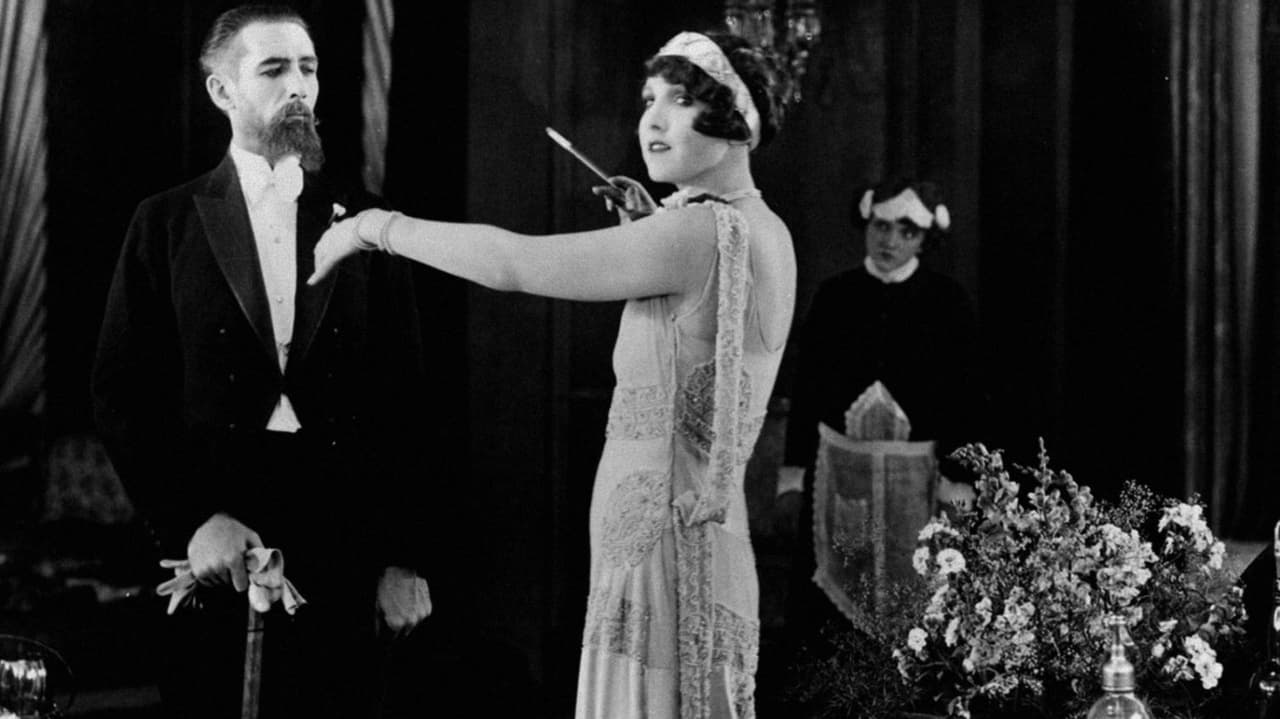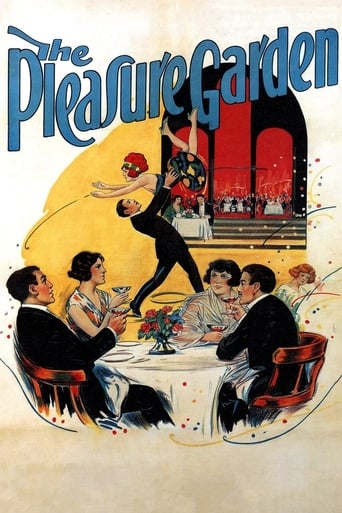

At the age of 25, Alfred Hitchcock, who had been an assistant director to Michael Balcon, was given the chance to direct his first film, which was of course silent. It is very good and showed at once that he had talent. Assistant director on the film was a girl named Alma Reville, who was to become Hitchcock's wife and lifelong partner in all of his film projects. The film is based on a popular novel by 'Oliver Sandys', which was the pen name of a woman whose real name was Marguerite Jarvis, and who in this same year appeared as an actress under the name of Marguerite Evans in the comedy film STAGESTRUCK, with Gloria Swanson. The title of this film is the name of a music hall in London, where two girls are in the chorus together, and share a room in Brixton. The melodrama concerns the adventures of their lives and respective fates. The film was shot at Babelsburg Studios in Germany and had an international cast. The American actress Virginia Valli plays Patsy, the good girl of the two. And Jill, the girl who goes to the bad, is played by another American actress, Carmelita Geraghty. The German actor Karl Falkenberg plays the unpleasant and sinister Prince Ivan, who leads Jill astray. Falkenberg acted in 100 films between 1916 and 1936, after which he disappears from history. Probably he was Jewish, was banned from the screen by the Nazis, and then sent to a death camp. Possibly the best performance in the film is by British actor Miles Mander, who outdid Falkenberg by appearing in 107 films, between 1920 and 1947, including WUTHERING HEIGHTS (1939). In this film he plays a cad who married Patsy and then betrays her with a mistress and goes to pieces with drink and decadence. He delivers a very finely judged performance, and does not overact. Carmelita Geraghty is very convincing in her downward spiral into immorality, selfishness, and selling herself for fame and fortune. The film is not particularly creaky with age, and is well worth seeing.
... View MoreThis is a moral tale of a couple of women, one good and the other lost in her own self- importance. It's also about two men who find themselves on the opposite side of fence as well. One is a kind, caring guy and the other a selfish womanizing cad. The first part of the show is about how two women in a chorus line evolve. One knows she has it and immediately demands the attention of everyone. She has been embraced by her friend who has been in the chorus for a while, but one she gains popularity, she has no time for the other woman. A marriage of convenience takes place and things really unravel. Also, the young starlet begins to realize that all her attention can't seem to make her happy. Things get kind of weird when the cad ends up in some island paradise with a native cookie whom he uses in every way possible. There are some really ridiculous confrontations and overacting by the principles. Everything gets wrapped up kind of neatly. Hitchcock was obviously learning the camera. I disagree with a previous comment about a monkey hanging around a film set being able to come up with this film. There are already hints of a style coming to the fore. It's too bad a couple of other first efforts have been lost to the inevitable decomposition of film (or simply lost).
... View MoreCompared to the industries in Hollywood and Germany, precious few British films from the silent era have been preserved and deemed worthy of study. The Pleasure Garden would probably have been consigned to the dusty bin of obscurity, were it not for its being the debut of one Alfred Hitchcock.Hitchcock was of course destined for greatness, so this picture inevitably gets scrutinised for hints of said greatness, or at least traces of Hitchcockiness. A point-of-view shot of the legs of a chorus line in the opening scene is often referenced as an example of such, a bit of pure voyeurism that is at odds with the moralist plot line. A slightly more story-orientated point-of-view shot occurs when a pickpocket eyes up Virginia Valli's handbag. Hitchcock was clearly interested from the beginning by the idea of putting the audience in the place of a character, and the latter example helps to tell the story visually, but it is of little long-term value. Neither the thief nor the leg-viewer become established characters, so there is really no need for us to "become" them.The way these early scenes are shot may be aimed to cut down on the intertitles by conveying the story visually. You see, during his apprenticeship Hitchcock had done some art direction work on Der Letzte Mann, a picture best known for containing no intertitles whatsoever except one at the beginning and one near the end. While the resultant excess of technique is in fact more distracting than title cards, the idea obviously fired the young Hitch's imagination. To avoid having to "tell", he goes to somewhat forceful lengths to "show". Then again, it could just be because the 26-year-old director really liked to look at women's legs.But after those showy opening sequences, The Pleasure Garden gets bogged down in a series of "talking" scenes. By contrast the interaction here is shot rather flatly, and there are suddenly lots of intertitles. This middle section of the picture is incredibly slow and boring. The plot is muddied by a lack of well-defined, memorable characters and the fact that the two female leads look very similar is especially confusing. In the melodramatic climax there are some vague attempts at psychological manipulation, with a few close-ups of a menaced Valli, but it's too little too late.The Pleasure Garden is full of tricks, many of which can be seen as corresponding to the technique of the later Hitchcock – "God" shots, point-of-view shots, close-ups to focus us on a particular object. But these are all things any monkey could pick up after hanging around a few film sets, and the director does not yet know how to put them to best use. The Pleasure Garden may pique the interest of Hitchcock completists, but other than that it is simply dull.
... View MoreThis was Hitchcock's first ever film as director to be completed and it is indicative of his huge talent. Despite its age and therefore somewhat primitive production the young Hitch does a superb, professional and classy job. The film maintains interest throughout and is still funny, entertaining and impressive when viewed today! Hitchcock imbues it with directorial flourishes of brilliance with clever, interesting camera shots, intelligent storytelling and little bits of his psychological themes which strengthen all his films.In conclusion this is a superb film considering its age and the fact it is Hitchcock's debut.
... View More